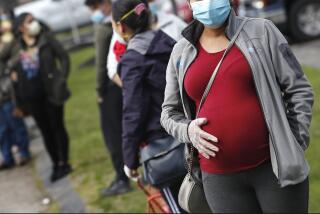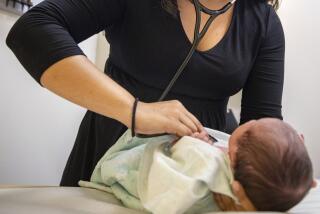Hospitals Asked to Be on Alert for Jaundice Problem in Babies
- Share via
A prominent health care organization warned U.S. hospitals Wednesday to watch out for the return of a rare but preventable type of brain damage in newborns that has been on the rise with shorter hospital stays and increased breast-feeding.
The Joint Commission on Accreditation of Healthcare Organizations, a health care accrediting group, issued an alert to 5,000 U.S. hospitals about kernicterus, a highly unusual condition that stems from severe jaundice.
Routine jaundice is very common--about 65% of all newborns develop it--and in the majority of cases, it goes away by itself, said Dr. Jeffrey Maisels, who heads a subcommittee of the American Academy of Pediatrics studying jaundice. In severe cases, doctors give light treatments or blood transfusions. Of the 4 million babies born each year, only 2% to 3% are treated for jaundice.
The condition is marked by a yellow discoloration of the skin that occurs in newborns because their bodies aren’t yet good at eliminating a naturally occurring blood chemical called bilirubin.
But when the bilirubin levels are severely elevated, doctors need to act aggressively to prevent complications. Most doctors today have barely seen a case of kernicterus, which produces cerebral palsy, hearing loss, speech problems and tooth malformation, Maisels said.
The commission called for medical follow-ups of all newborns within two days of going home, as well as better education of parents.
Doctors estimate that in only 1 in 100,000 to 1 in 500,000 cases does a severely jaundiced baby develop kernicterus, according to Maisels. However, there are no reliable statistics and the disorder is not tracked by the federal Centers for Disease Control and Prevention.
Since 1984, only 90 cases--three of them fatal--have been logged by doctors reporting cases on an informal basis.
But the disorder could be prevented if the mothers of all babies discharged from hospitals less than 48 hours after birth make sure the child receives a checkup from a doctor or pediatric nurse within two days of going home.
Those first few days after birth are a critical time for a baby. Although mother and child may have been home several days, it’s four to five days after birth that bilirubin levels peak. And it’s during those same few days that mothers may be struggling with nursing technique and their milk may not yet have come in. Undernourishment is a risk factor for kernicterus, so mothers with nursing troubles should make sure they get breast-feeding help or feed the baby supplements, Maisels said.
Other risk factors include:
* Jaundice that appears in the first 24 hours after birth.
* Premature birth, usually three to five weeks early.
* Bruising, which boosts production of bilirubin.
* Ethnicity, because jaundice is harder to detect visually in darker-skinned babies.
* Siblings who have had significant jaundice.
Maisels, chairman of pediatrics at William Beaumont Hospital in Royal Oak, Mich., noted that in 1994 the pediatric association issued guidelines to help doctors prevent kernicterus. Doctors need to take care to incorporate those recommendations into their practice, he said.
The joint commission issued its alert, in part, because of parent advocates who have been seeking to draw attention to kernicterus.
Dr. Paul Schyve, senior vice president of the joint commission, said he first learned of the kernicterus problem during a discussion of patient safety issues at a meeting he attended.
“Here was a concrete example in which there were patients--newborns--who were harmed and yet we knew there were ways we can prevent this,” he said.
Schyve said the commission and pediatric association are not advocating that mothers and infants be kept longer in hospitals after delivery.
Instead, he said, they want medical professionals to better monitor newborns and teach mothers to recognize risks once they’ve taken the children home.
More to Read
Sign up for Essential California
The most important California stories and recommendations in your inbox every morning.
You may occasionally receive promotional content from the Los Angeles Times.








